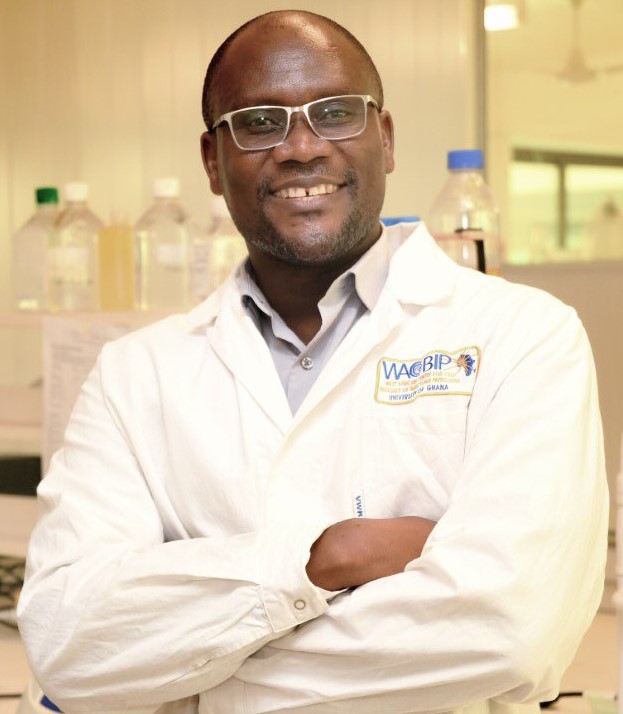GVN Center and Member Spotlight

Dr. Osbourne Quaye
Head of the Virology Laboratory and Lead of Monitoring and Evaluation
West African Centre for Cell Biology of Infectious Pathogens (WACCBIP), University of Ghana
Associate Professor and Head of Department
Department of Biochemistry, Cell and Molecular Biology, University of Ghana
What are you and your institution currently working on regarding COVID-19?
My institution is involved in COVID-19 activities, including epidemiology studies among various targeted groups and in different locations throughout Ghana. As part of routine surveillance and monitoring, we are involved in whole genome sequencing of SARS-CoV-2 strains that are circulating in Ghana. In estimating community-level exposure to SARS-CoV-2 in Ghana, lateral-flow rapid diagnostic tests were used in a multi-phased seroprevalence study that targeted locations including markets, transport terminals, shopping malls, hospitals, and research institutions that are involved in COVID-19 testing and/or studies. A higher COVID-19 seroprevalence was observed in the study than what was officially reported as a country, due to a high number of asymptomatic cases, suggesting a relatively lower case-fatality in Ghana. Exposure was observed to be significantly higher in markets and transport terminals compared to other locations, and higher in participants with no formal education and/or work in informal sectors compared to people with formal education and/or work in formal sectors, respectively.
The Virology Laboratory is also working on a project aimed to determine the kinetics of the SARS-COV-2 specific humoral responses among symptomatic and asymptomatic infected individuals in Ghana, develop and characterize monoclonal antibodies against SARS-CoV-2, generate monoclonal antibodies from immortalized human B cells isolated from seroconverted SARS-COV-2 infected individuals, and characterize cytokine profile that are associated with severe disease among Ghanaian COVID-19 patients.
 Would you please expand upon your collaborative work on COVID-19 basic science research?
Would you please expand upon your collaborative work on COVID-19 basic science research?
The Virology Laboratory of WACCBIP partnered with the laboratory of Christopher J. McCormick at the University of Southampton, UK in developing a SARS-CoV-2 nucleocapsid capture ELISA and assessed its diagnostic performance on nose and throat swabs from patients in Southampton, UK and sputum from study participants in Ghana. Polyclonal antibodies that were obtained in sera from immunized rabbits has displayed strong reactivity to SARS-CoV-2 nucleocapsid. Thus far, the capture ELISA has been shown to be cost effective and required minimal laboratory equipment, and therefore will be highly useful in low- and middle-income countries.
In collaboration with KU Leuven, Belgium in the laboratory of Johan Neyts, the Virology Laboratory was involved in the discovery of a live virus-vectored SARS-CoV-2 vaccine candidate. Yellow fever virus 17D vaccine was used as vector to express a non-cleavable prefusion form of the SARS-CoV-2 spike protein and assessed in animal models. The discovered vaccine had an incredibly good safety profile and induced high levels of SARS-CoV-2 neutralizing antibody in hamsters, mice, and cynomolgus macaques. A single dose of the vaccine conferred protection from lung disease in hamsters, as well as prevented infection with SARS-CoV-2.
Professional Summary
Dr. Osbourne Quaye is the Head of the Virology Laboratory of the West African Centre for Cell Biology of Infectious Pathogens (WACCBIP) and very much interested in all viruses as pathogens. His research group currently works on gastrointestinal viruses including rotaviruses, noroviruses and adenoviruses to understand the influence of sanitation and zoonotic transmission on disease burden, virus diversity, and vaccine efficacy. The group also works on HIV latency and drug discovery, host genetic polymorphisms in hepatitis B, C and D infections, and the surveillance of filoviruses in bats, Epstein Barr and yellow fever viruses. Dr. Quaye is an Associate Professor and Head of Department at the Department of Biochemistry, Cell and Molecular Biology, and the Head of Monitoring and Evaluation at WACCBIP, University of Ghana, Legon. He has an M.Phil. degree from the University of Ghana, Legon and a Ph.D. from the Georgia State University, Atlanta, GA. His research carrier as a Molecular Virologist started at the Centers for Disease Control and Prevention (CDC), Atlanta, GA as a Microbiologist in Molecular Virology.
About the West African Center for Cell Biology of Infectious Pathogens, (WACCBIP)
The mission of The West African Centre for Cell Biology of Infectious Pathogens, University of Ghana (WACCBIP) is to conduct cutting-edge research and spearhead innovation to guide development of new approaches to disease diagnosis, prevention, and control. The priority pathogens include protozoans causing diseases such as malaria and trypanosomiasis; Mycobacteria, causing tuberculosis and Buruli ulcer; other bacteria causing gastro-intestinal and blood infections; and viruses, including HIV, rotaviruses, Influenza, and Dengue.
